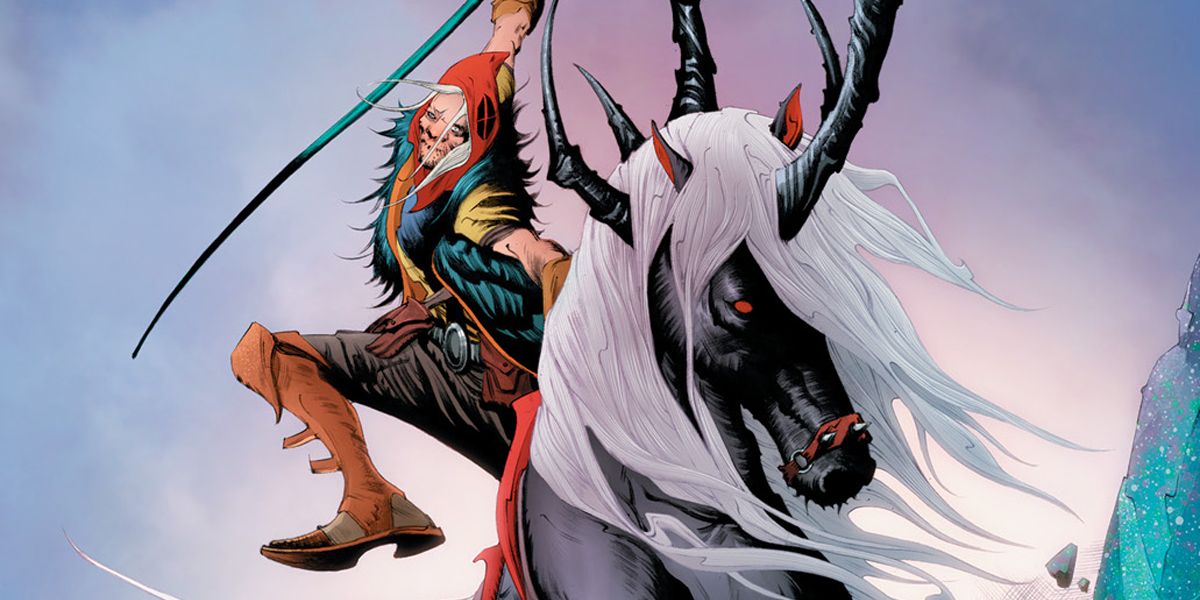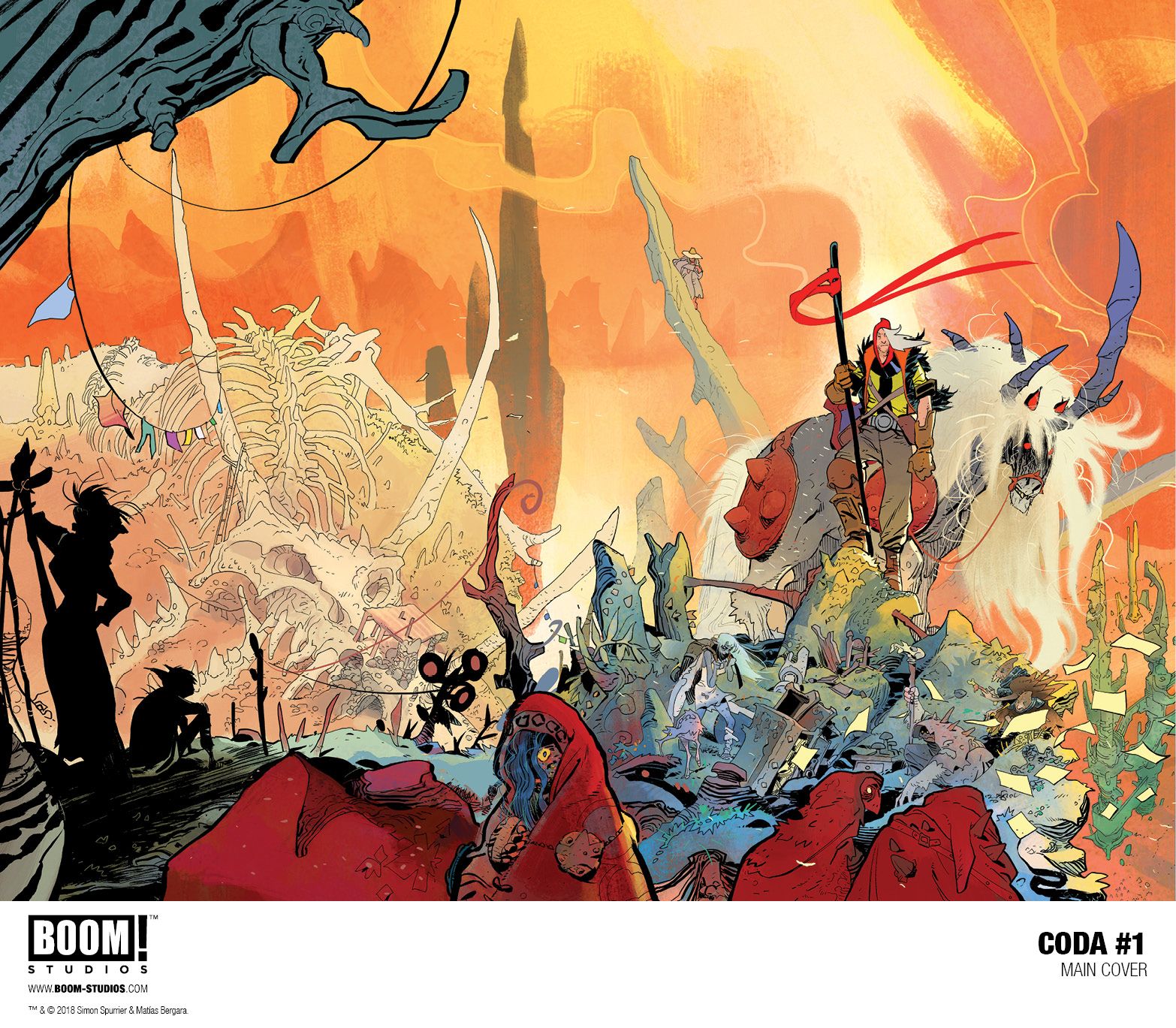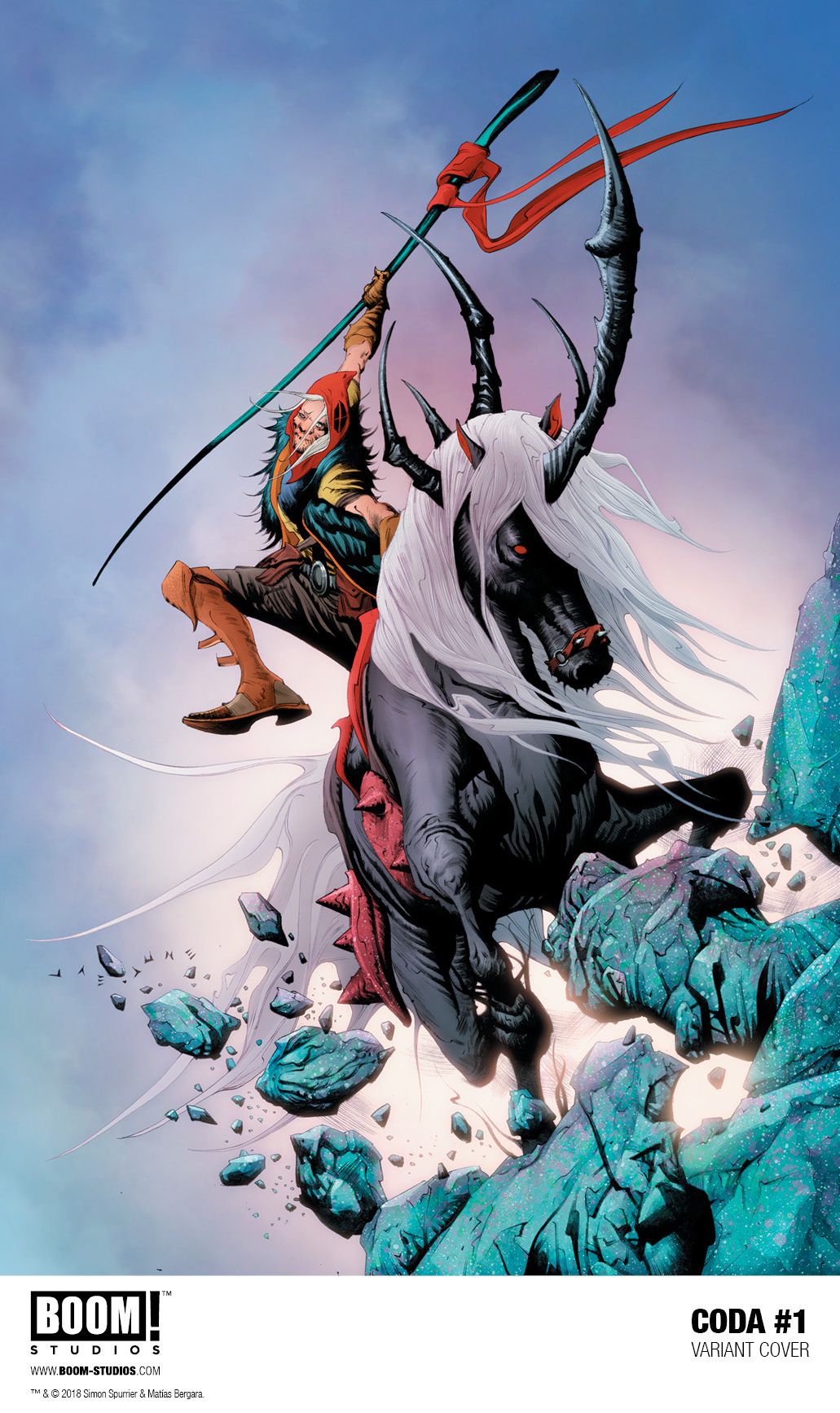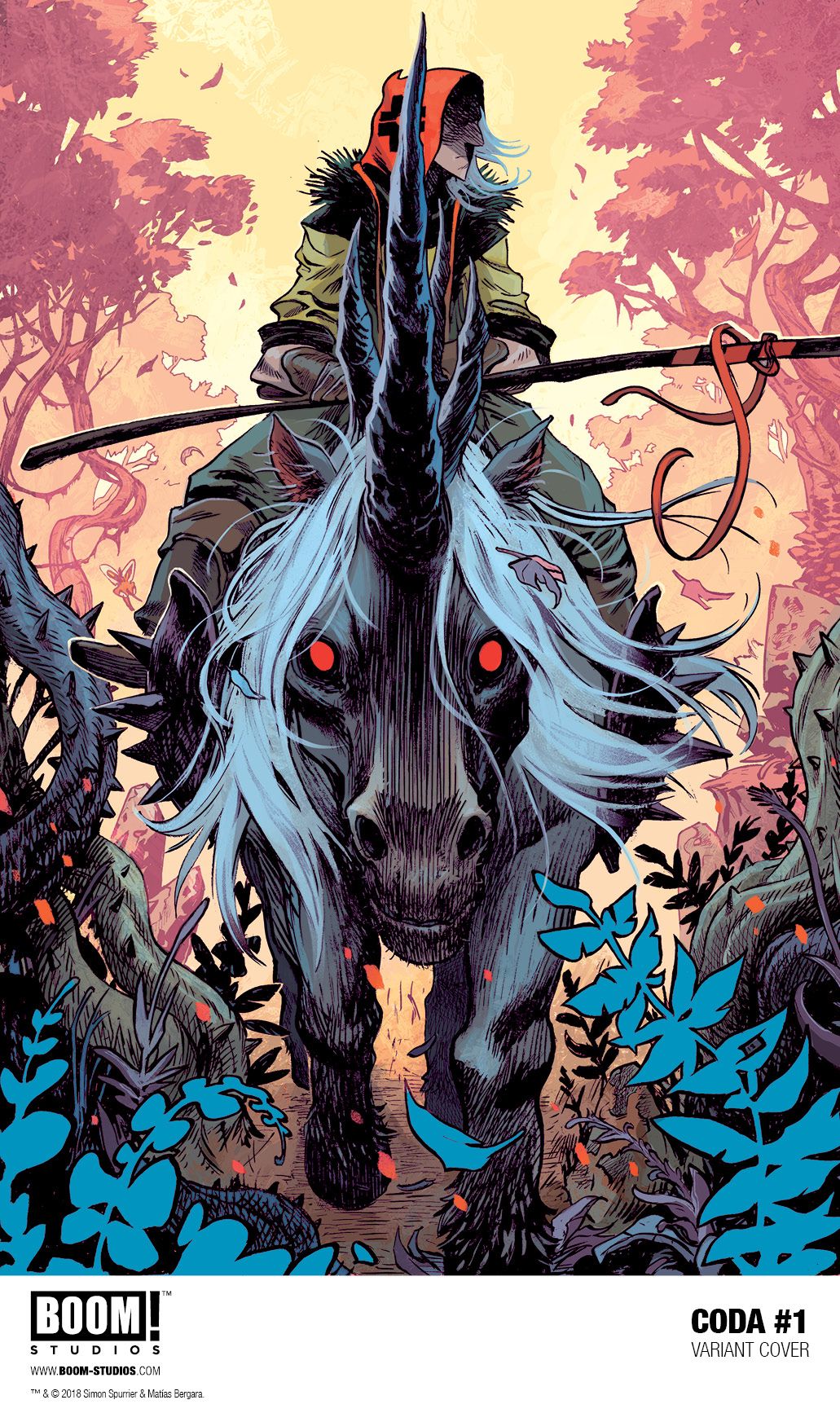Writer Simon Spurrier has gained a reputation in the comic book world as one of today's most imaginative creators, from his trippy X-Men Legacy run that inspired FX's Legion TV show to creator-owned works such as Angelic and Cry Havoc at Image Comics.
Last fall at New York Comic Con, it was teased that Spurrier would write a new series for BOOM! Studios -- the home of his books The Spire, Godshape and Six-Gun Gorilla -- titled Coda, which would be his take on "Tolkien-esque high fantasy." No other details were announced at the time, but CBR now has all the pertinent info on the new series: Coda is a 12-issue series from Spurrier and artist Matías Bergara (artist of Image's Cannibal) slated to debut in May. The first issue will have 40 pages of story at a $3.99 cover price, and a main cover by Bergara plus variants from Jae Lee and prior Spurrier collaborator Jeff Stokely.
Here's the official description of the series, which tantalizingly includes the words "foul-tempered mutant unicorn": "In the aftermath of an apocalypse which wiped out nearly all magic from a once-wondrous fantasy world, an antisocial former bard named Hum seeks a way to save the soul of his wife with nothing but a foul-tempered mutant unicorn and his wits to protect him...but is unwillingly drawn into a brutal power struggle which will decide forever who rules the weird wasteland."
CBR spoke with Spurrier, Bergara and series editor Eric Harburn to learn more about Coda, and that foul-tempered mutant unicorn. One thing made clear by Spurrier is that though high fantasy was how the series was originally pitched, Coda looks to stray far from the genre's familiar trappings. As he puts it: "High fantasy's dead. Sorry about that. Coda's what happens the morning after the funeral."
CBR: Simon, when first teased back at NYCC, Coda was described as your take on "Tolkien-esque high fantasy." How much fun have you had exploring that fairly specific genre -- and presumably, diverting from it as you see fit?
Simon Spurrier: I’ve always intended to do something in the high fantasy mold sooner or later. But whenever I took a run at it I found my brain somehow bouncing off. To put it in uncharitable terms, I could feel this accumulated layer of clichés and overused ideas packed tightly around the whole genre, like six decades' worth of blisters. Your average Scion Of Tolkien just takes itself so appalling seriously, and it sometimes felt like the only workaround was to do something snide and mean-spirited; a story that does nothing more than poke fun at the whole thing. Which, given how much joy fantasy’s given me over the years, simply felt too cruel -- even for me.
In the end it struck me that the whole genre has a sort of literary RSI. Every time it gets let out of the stable to canter around that same well-trodden path, the injury just gets worse and worse.
So I decided the kindest approach was to take it outside and shoot it.
High fantasy's dead. Sorry about that. Coda's what happens the morning after the funeral.
Turns out what happens is this: life goes on. People continue to be in love. People continue to struggle and feel and fight. They simply have to adjust to a world with an absence where previously there was something cherished or relied upon.
In Coda, that's magic. Not so long ago this world was saturated in the stuff. Whole societies grew, functioned and warred as a result of it. And then -- a crash. And now there’s barely any magic left. And everyone has to adjust fast.
What we've ended up with is a story that's drenched in the sort of sadness you get whenever one world is transitioning into another -- there's a bit of the Wild West about it, in that respect -- but it also seethes with energy and excitement. New frontiers, new ideas, new action, new opportunities. New ways of dealing with people who can only look backwards. And -- yes -- new reasons to laugh.
Page 2: [valnet-url-page page=2 paginated=0 text='Meet lead character Hum and the foul-tempered mutant pentacorn']
How did the lead character Hum take shape for you? And what can you share about this foul-tempered mutant unicorn -- er, pentacorn?
Spurrier: Hum’s specific personality just sort of suggested himself as a result of the landscape we were envisaging. Like, we took a deep dive into that special sort of wide-angled quiet and stoicism you’ll find in the best westerns (up to and including the two good movies in the Mad Max quadrilogy), so immediately we’re looking at a Person Of Few Words, very still and self controlled, but -- liked a coiled spring -- ready to burst into action. And drenched in a sad sort of longing, like all the best western heroes.
We ended up (I love this) with the idea of a Lonely Misanthrope: a guy who distrusts and gets irritated around other people, but hates being alone. And that in turn immediately suggested his overarching tale: seeking to relocate and rescue the one and only person he’s ever met whose company he can tolerate. There are, I warn you, Many Twists along this road. Never trust the testimony of a man in love.
But as I was plotting the arc, something about the way fantasy works -- and the subgenre of High Fantasy in particular -- sat up and started demanding more attention. Eventually I identified it as a longing for language. Something about poetry, something about the borrowed honesty of an erudite perspective, which fits so neatly into fantastical worlds. I realized that our curmudgeonly wanderer was insisting he wanted to write. Wanted to keep diaries. Wanted to express in epistolic form all the deep, dangerous emotions he’d never dream of saying out loud.
And, like all diarists, he lies to himself. A lot.
So that’s Hum. A former court bard, who once got paid to write sagas about all the boastful bullshit of Knights and Wizards and Lords, who now writes only for himself. Riding through wastelands of mutant life and post-magic renewal, looking for a way to save his beloved.
...with nobody for company except, as you say, a five-horned unicorn called The Nag. It, likewise, arose to suit the space and the story. We didn’t want Hum to be just another identikit knight or ranger (worth noting: Coda saves a special dose of scorn for the quintessential Paladin). Hum’s a man of cunning and survival on a mission of the heart -- and he has a pretty major physical disability too -- so a steroidal swordsman didn’t fit the bill. The solution was to provide him with a top-of-the-range vehicle. Mad Max has the V-8 Interceptor; Hum has an adorably murderous stabbyhorse with an enviable fringe. Who may very well steal the show.
Matías, a series like this always feel like a uniquely expressive opportunity for an artist, given the imaginative possibilities of the characters and setting. What has the experience been like for you?
Matías Bergara: It feels like the best possible opportunity for an artist like myself. I love fantasy and most of the artists who have influenced my work were from that field -- I think those will be very visible all throughout Coda along my own personal quirks and tricks.
Without delving into spoiler territory, what's been some of the most satisfying visuals you've drawn so far in the story? This foul-tempered unicorn is certainly intriguing.
Bergara: I love little creatures, big action and huge spaces. There's gonna be lots and lots of mystical and dark things populating this crazy world that I can't wait for you to see!
Eric, You've now worked with Si Spurrier on quite a few series for BOOM! Studios. What's it like collaborating with such an unrestrained creative force?
Eric Harburn: Si was actually one of the very first writers I worked with after starting at BOOM!. Being able to ride shotgun these past six-plus years from Six-Gun Gorilla to The Spire to Weavers and Godshaper has been an absolute privilege, and at this point I can't imagine a world in which we're not collaborating in some shape or form. He is, as you said, a creative force to be reckoned with -- but also a writer that understands comics is a team game, which I think will be evident once again when Coda hits shelves.
Matías Bergara isn't as known to fans, but has slowly been building his name in the industry. What did you see in his work that made him right for Coda?
Harburn: Matías's work is criminally underrated, but I think that's all about to change come May. Coda is a statement -- Matías is matching Si's inventiveness punch for punch, and the result is a vibrant, visceral, volatile fantasy series that does something truly new with the well-worn genre.
Coda #1 debuts from BOOM! Studios in May.




